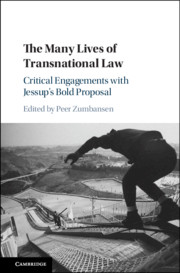Book contents
- Reviews
- The Many Lives of Transnational Law
- The Many Lives of Transnational Law
- Copyright page
- Contents
- Contributors
- Preface and Acknowledgements
- Introduction Transnational Law, with and beyond Jessup
- Part I Transnational Law
- Part II Transnational Law as Regulatory Governance
- Part III Transnational Law
- Part IV Conclusion
- Index of Names
- Subject Index
Introduction - Transnational Law, with and beyond Jessup
Published online by Cambridge University Press: 18 March 2020
- Reviews
- The Many Lives of Transnational Law
- The Many Lives of Transnational Law
- Copyright page
- Contents
- Contributors
- Preface and Acknowledgements
- Introduction Transnational Law, with and beyond Jessup
- Part I Transnational Law
- Part II Transnational Law as Regulatory Governance
- Part III Transnational Law
- Part IV Conclusion
- Index of Names
- Subject Index
Summary
The chapter introduces a collection of essays first presented at an international conference at the Transnational Law Institute, King’s College London. The authors engage Philip Jessup’s landmark study, “Transnational Law” (1956) and go well beyond that. Jessup’s book launched an analysis of the role that law plays for border-crossing human and institutional relations. But, the context in which Jessup wrote – as an international lawyer, an arbitrator and economic lawyer – is today one of global geopolitical change and domestic state transformation. Both render the interdisciplinary investigation into law’s role in a global context ever more crucial. “Transnational law” – as label, concept or methodology – occupies an important place in this undertaking, not as a marker of a new, self-standing doctrinal legal field, but as an opportunity to think about the foundations of law today in a volatile, deeply divided world. Transnational law becomes a methodological laboratory in which to study law’s relation to other forms of social ordering, its sources and norms, its actors and processes, its regulatory aspirations and democratic (and, other) infrastructures.
Keywords
- Type
- Chapter
- Information
- The Many Lives of Transnational LawCritical Engagements with Jessup's Bold Proposal, pp. 1 - 54Publisher: Cambridge University PressPrint publication year: 2020

